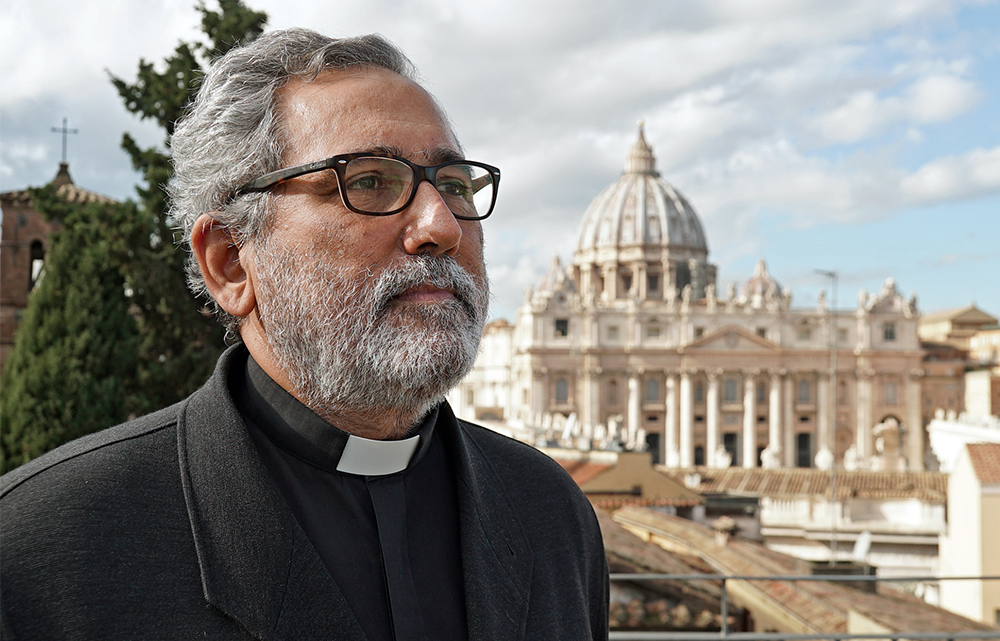VATICAN CITY (RNS) — Donations to the Holy See are expected to continue to drop following financial scandals currently at the heart of a high-profile Vatican trial. The institution is tackling an expected deficit of $37 million, according to its 2022 budget projection published Friday (Jan. 28).
The Vatican expects to have an income of $857.1 million and expenditures of $894 million in 2022. Efforts to cut costs in the department and offices that make up the Roman Curia have led to a reduction of its expenditures by about $4.5 million.
The COVID-19 pandemic negatively impacted the institution’s finances, which largely depend on foreign tourists visiting the Vatican Museums. But financial scandals surrounding the purchase of a costly property in London using a fund destined for charity, known as Peter’s Pence, has undermined the Vatican’s credibility and cost it millions of dollars.
The London property purchase is at the center of the ongoing Vatican trial of 10 individuals, including Cardinal Angelo Becciu, who are charged with — among other things — abuse of power, corruption and money laundering.
The Vatican will publish a report on Peter’s Pence in the coming months, but donations are expected to have decreased by 15% in 2021, said Juan Antonio Guerrero Alves, head of the Vatican’s Secretariat for the Economy, in an interview with Vatican Media published alongside the 2022 budget.
Donations to Peter’s Pence in 2021 decreased to barely over $41 million following a downward trend that can be traced to before the onslaught of the pandemic.
While COVID-19 has negatively impacted donations due to reduced Mass attendance, Guerrero acknowledged that the real issue is restoring the reputation of the church among the faithful by increasing transparency and enacting modern accounting regulations.
“We are well aware that we have made major mistakes in financial management, which have undermined the credibility of the Holy See,” Guerrero said. “We seek to learn from them and we believe we have remedied them so that they do not happen again.”

The Rev. Juan Antonio Guerrero Alves in 2019. Photo by Robert Ballecer, courtesy of Society of Jesus
Guerrero also said the Vatican has signed a contract with a buyer for the controversial London property. “The loss from the alleged swindle,” Guerrero said, “was already taken into account in the balance sheet.”
Other measures include enacting Pope Francis’ new laws requiring greater fairness and transparency in the institution and reducing expenses by Vatican departments. “Obviously, there is a limit to the reduction — the mission has to be accomplished,” Guerrero said.
RELATED: Catholic actors Mark Wahlberg and Mel Gibson to tell story of boxer turned priest
In 2019, Pope Francis issued a law for the purchase of goods and services by Vatican entities that, while increasing transparency, also added to the length and bureaucracy of such operations.
“We are probably weighed down too much by a few mistakes of the past that have detracted from our credibility as a Church,” Guerrero said, adding that the “excess of unnecessary bureaucracy” is probably born from the “fear of falling into the lack of accountability that led to those mistakes.”
This year’s budget projection has increased the number of entities included in its calculations from 60 to 90, adding other institutions, such as hospitals like the Bambino Gesù Pediatric Hospital, and papal basilicas and sanctuaries. As a result, the overall expenditures actually increased by roughly $11 million.
The decision of the Vatican’s Council for the Economy to include these new entities in the budget “is because these new parameters allow for a more complete view of the economic situation of the Holy See,” said Guerrero.
Despite the institution’s financial challenges, the Vatican has found a silver lining. “We have learned a lot from each other, and we have found a method of teamwork that was not widely practiced in the Holy See,” Guerrero said, recalling the ingrained practice by Vatican departments to jealously protect their own areas of influence and competence.
“Slowly, the culture is changing. We are working in the right direction,” he added.
The Vatican is also working to find other solutions to restore its troubled finances, including better management of the institution’s real estate holdings and centralizing its financial investments, Guerrero said. But fixing the Vatican’s internal efficiency won’t be enough, he added.
“We also need to look for ways to attract more donations. The first requirement is transparency and clear accountability, and I think we have taken many steps in this direction,” he said.
Guerrero said local churches throughout the world will also have to pitch in to help the Roman Curia, which supports and manages charitable activities and papal ambassadors. The 2022 expected budget shows that most of the Vatican’s resources are used to sustain struggling churches (21%), promoting the Vatican’s mission and message (16%), preserving its global presence (16%), supporting evangelization efforts (16%) and enacting charitable works (9%).
The Vatican must “enlist the help of the faithful, who want to support the Pope in his mission of unity in charity, which is, after all, what the Roman Curia does,” Guerrero said, adding that the publication of these reports might appease Catholic donors who can now see how their money is spent.
RELATED: Catholic bishops oppose some Biden programs, support others





